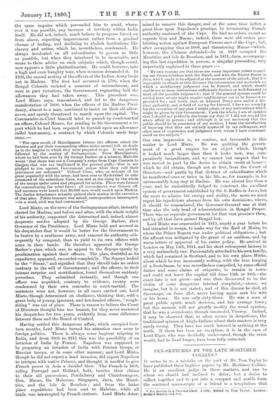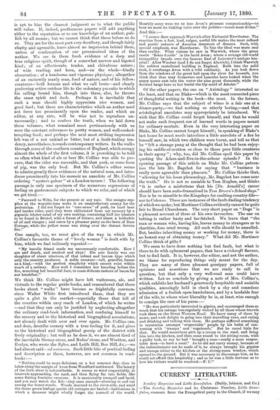PEN-SKETCHES BY THE LATE MORTIMER COLLINS
IT seems to us a mistake on the part of Mr. Tom Taylor to have published these fugitive papers by Mr. Mortimer He is an excellent judge in these matters, and one to whom we should feel inclined to defer ; but a desire to collect together and to put into a compact and usable form the scattered manuscripts of a friend is a temptation that • Pen Sketches by a Vanished hand. 2 vole. Edited by Tom Taylor. London : Richard Bentley and Son.
is apt to bias the clearest judgment as to what the public will value. If, indeed, posthumous papers will add anything either to the reputation or to our knowledge of an author, pub- lish by all means ; but we cannot think that those before us do so. They are for the most part very desultory, and though fairly -chatty and agreeable, leave almost no impression behind them, unless of confirmation of our preconceived ideas of the author. We see in them fresh evidence of a deep and true religious spirit, though of a somewhat narrow and bigoted kind; of an affectionate, tender, and chivalrous nature ; of wide reading, and keen, and—on the whole—kindly 'observation ; of a handsome and vigorous physique ; altogether of an eminently manly man, fond of nature, and of his fellow- creatures—both human and what we call brute—and clearly preferring active outdoor life to the sedentary pursuits to which his calling bound him, though into these, also, he throws the same spirit and dash. Perhaps it is inevitable that such a man should highly appreciate nice women, and good food; but these are characteristics which an author need not force too prominently upon the reader, and which an editor, at any rate, will be wise not to reproduce un- necessarily ; and to confess the truth, when we laid down these volumes, what remained most pertinaciously with us were the constant references to pretty women, and well-cooked' tempting food ; and perhaps the next most striking impression left was of a not unkind or bitter, but of a fault-finding ten- dency, nevertheless, towards contemporary writers. In the walks through some of the southern counties of England, which occupy almost the whole of the first volume, it is provoking to be told so often what kind of ale or beer Mr. Collins was able to pro- cure, that the cider was execrable, and that pork, or some form of pig, was the only food. But Mr. Collins's editor seems to admire greatly these evidences of the natural man, and intro- duces prominently into his memoir an anecdote of Mr. Collins ordering " oysters galore " at a London tavern ! The following passage is only one specimen of the numerous expressions of feeling on gastronomic subjects to which we refer, and of which we get tired :—
" Farewell to Wilts, for the present at any rate. The meagre sup- plies at the wayside-inns make it an unsatisfactory county for the pedestrian. I did not forget its yore-arms' of pork, its hard beer and harder cider, until they were obliterated from my memory by a gigantic lobster-salad of my own making, containing half the lobsters to be found in Bristol, with a forest of lettuce, and about a kdderkin of oil and vinegar ; and eaten by a pleasant party on the lawn of Rose Cottage, while the yellow moon was rising over the distant Severn Sea."
One sample, too, we must give of the way in which Mr.
Collins's favourite theme of " lovely woman " is dealt with by him, which we find tediously repeated :—
" My bucolic friend made me uncommonly comfortable. How I ate and drank, and smoked and slept ! His sole family was one daughter of about nineteen, of that robust and buxom type which only the country produces. A noble creature—tall, graceful, lissom as a hind,—with the perfect simplicity which cannot exist within Teach of a railway. How well I remember her kneeling before the fire, scorching her beautiful face, to toast delicate rashers of bacon for our breakfast."
We think Mr. Collins might have left waitresses, ale, and victuals to the regular guide-books, and remembered that these books about " walks " have become so frightfully common, since Walter White first introduced them, that they are quite a glut in the market—especially those that tell of the counties within easy reach of London, of which he writes —and that they can only be justified by neglecting altogether the ordinary road-book information, and confining himself to the scenery and to the historical and biographical associations, not already dealt with over and over again. Mr. Collins can, and does, describe scenery with a true feeling for it, and gives us the historical and biographical gossip of the district with lively originality ; but well as he does it, we are almost tired of the inevitable Stoney-cross, and Rufus' stone, and Wootton, and Evelyn, who wrote the Saliva, and Leith Hill, Box Hill, &c.,—we had almost said—ad nauseam. Such little bits of poetical feeling and description as these, however, are not common in road- books :—
" Nothing could be more delicious, on a hot summer day, than to loiter along the margin of Avon from Woodford northward. The beauty of the little river is indescribable. It seems to wind coquettishly, at intervals approaching the road, and then flying far into fields, like some flirting feminine creature. It is unutterably tranquil and lucid, and you may watch the fish—tiny ones enough—shooting in and out among the water-weeds. Woods descend to the river-side, and amid the dense green leafage quaint old cottages are buried—habitations in which a dreamer might wholly forget the turmoil of the world.
Heartily sorry were we to lose Avon's pleasant companionship—to hear no more its tinkling voice over the pebbles—music most divine."
And this :—
" I scarce dare approach Warwick after Nathaniel Hawthorne. The reaction from a fast, loud, vulgar, sordid life makes the most refined and poetic natures of America dreamers of dreams. Such, with special emphasis, was Hawthorne. To him the ideal was more real than reality. What visions he saw in Warwick, where the great castle floats double' in the lucid Avon ; where a strange old-world tranquillity broods over the famous Earl of Leicester's antique hos- pital ! After Windsor (and I do not forget Alnwick), I think Warwick the noblest castellated building in England. Built into the solid rock, it overhangs Avon with a wild sublimity. As you look down from the windows of the great ball upon the river far beneath, you think that thus may Guinevere and Lancelot have looked when the angry queen cast into the water the nine great diamonds, while the doomed barge bore to her burial the lily-maid of Astolat."
Of the other papers, the one on " Aristology " interested us the least, and that on Blake—which is the most connected piece of thoughtful writing in the book—the most. In the former, Mr. Collins says that the subject of wines is a fair one at a dinner-party,—we find nothing so utterly boring,—and that aristological anecdotes may appropriately be introduced. We wish that Mr. Collins could forget himself, and that he would not make such frequent use of learned words in papers meant for ordinary mortals. Even in the very interesting paper on Blake, Mr. Collins cannot forget himself; in speaking of Blake's last home he must needs introduce a little anecdote of a fire he himself saw, in which two children were burnt, and tell us that he "felt a strange pang at the thought that he had been enjoy- ing his saddle-of-mutton so close to those poor little creatures in their agony " ; why, too, did Mr. Collins spoil this paper by quoting the Adam-and-Eve-in-the-arbour episode ? In the opening passage of this article on Blake Mr. Collins patron- ises the late Mr. Bagehot for saying that " business is really more agreeable than pleasure." Mr. Collins thinks that, " allowing for his loose phraseology, Mr. Bagehot has come near the truth." He is not so amiable to Tom Hughes, and thinks "it is rather a misfortune that his [Dr. Arnold's] career
should have been melo-dramatised in Tom Brown's School-days." Nor is he so aimable to the Kingsleys for exalting country-life-
nor to Colenso. These are instances of the fault-finding tendency of which we spoke; but Mortimer Collins evidently cannot be quite fair to Broad Churchmen. The very short paper on " Dogs " is a pleasant account of three of his own favourites. The one on betting is rather hasty and far-fetched. We learn that "the man or woman who, having kin, leaves money to strangers or to charities, does cruel wrong. All such wills should be annulled.
But, besides inheriting money or working for money, there is no honest way of obtaining money." What did Mr. Mortimer Collins think of gifts ?
We seem to have done nothing but find fault, but what is there to do with ephemeral papers, that have a rech.auffe flavour, but to find fault. It is, however, the editor, and not the author, we blame for reproducing things only meant for the day. They are many of them pleasant gossippy papers, full of opinions and assertions that we are ready to call in question, but that only a very well-read man could have written. Let us conclude by giving a note of Mrs. Collins's, which exhibits her husband's generously hospitable and sociable qualities, amusingly held in check by a shy and conscious admission of a foolish open-handedness, and by a laudable fear of the wife, to whose wiser liberality he is, at least, wise enough to consign the care of his purse :—
" He was particularly interested in gipsies, and encouraged them so much that his cottage was regularly visited by all those whose travels took them on the Great Western Road. He knew many of them by name, and took delight in going into their travelling vans, and eating and drinking and talking with them. He perhaps suffered something in reputation amongst respectable' people by his habit of con- versing with 'tramps' and 'vagabonds.' But he cared little for that. He would sometimes pick up a tramp in the road, and bring him into the kitchen, and then come round to the sitting-room, with a guilty look, to say he had brought a man—really a most respec- table man—to have a meal.' As he did not carry money, because of the indiscriminate use he made of it, he always brought his gipsies and tramps either to the kitchen or the sitting-room window, which opened to the ground. But it was necessary to discourage him, as he could not afford this hospitality ; and so he was a little nervous as to how his visitors would be received.—F. C."



































 Previous page
Previous page